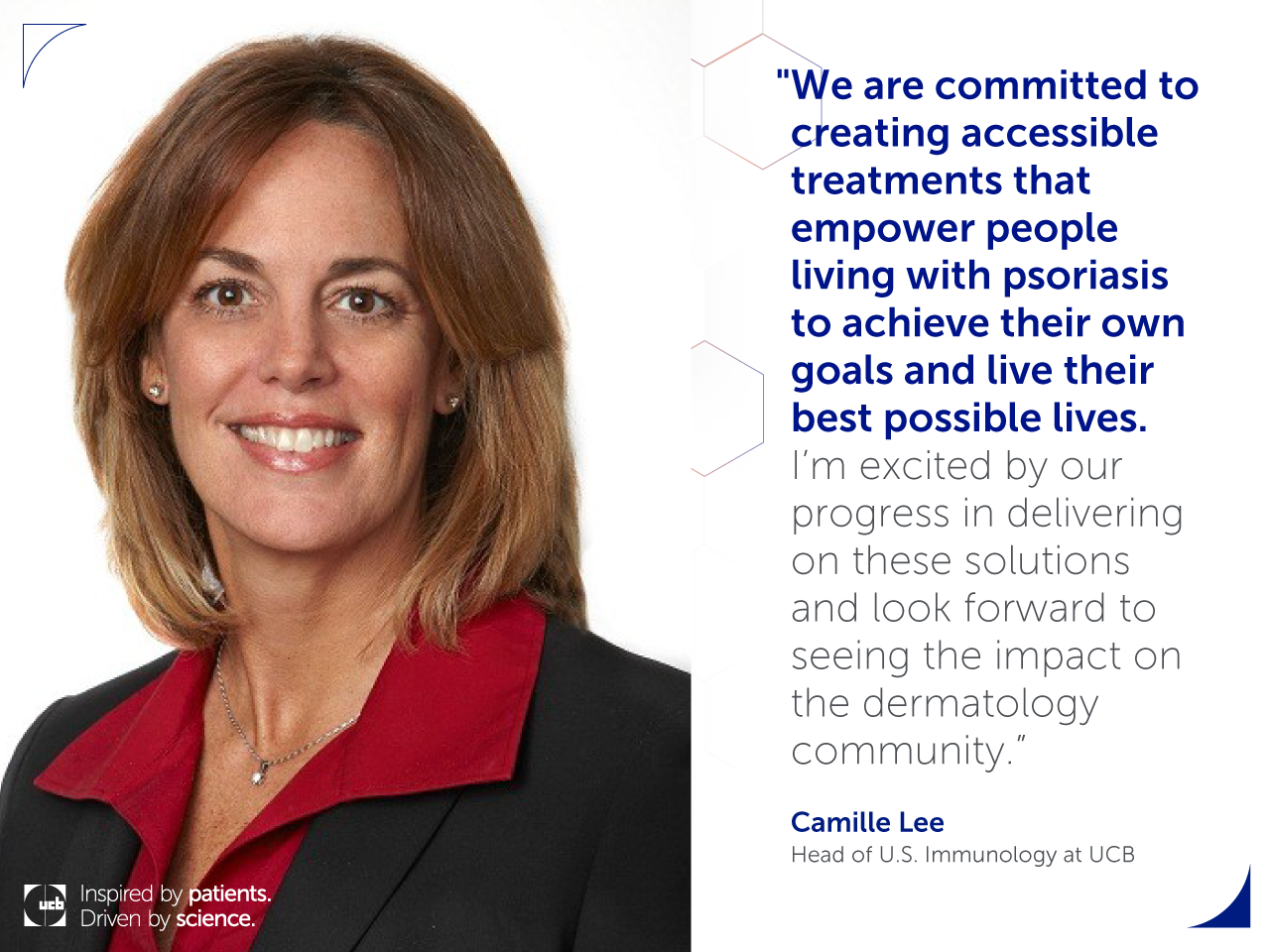
Upon joining the team at UCB over 4 years ago, I was immediately inspired by everyone’s commitment to and passion for creating differentiated solutions for people living with severe and chronic diseases. I have always found my motivation in empowering people to manage their health, so their life can be the focus, not their disease. At UCB, we consider each person’s journey to help them achieve their own goals and live their best possible life.
Part of what I’ve found makes UCB unique is the robust research, both quantitative and qualitative, that goes into understanding the patient journey and needs, and applying these insights in every stage of the clinical development and commercialization process. We talk with people living with psoriasis and listen to what they experience, which helps us appreciate the impact it can have on their physical and emotional well-being.
At the surface, psoriasis is one of the most common autoimmune disorders, affecting approximately 8 million people in the U.S. alone.1,2 It causes rapid buildup of extra skin cells that form thick, silvery scales and itchy, dry, red patches.3 But when you dig deeper, you learn that psoriasis is more than a skin disease.
We have heard that after receiving a psoriasis diagnosis, many people feel forcibly displaced from their sense of self.4 People living with psoriasis often report negative mental health and social well-being, and 94% of people with a moderate-to-severe form of the condition feel their psoriasis has a significant impact on their quality of life.2,5,6 They begin their care journey and oftentimes feel there is no clear destination or relief.4 More than half of patients being treated for moderate-to-severe plaque psoriasis don’t feel that they are achieving clear or almost clear skin and, more importantly, many of these patients do not believe this to be a realistic treatment goal.7 People living with psoriasis deserve better.
At UCB, we refuse to accept the conventional expectations for skin clearance. We know that increased levels of skin clearance are correlated with improvements in quality of life.4,5 Because of this, we are committed to creating accessible treatments that empower people with psoriasis to expect more from their treatment.
I’m excited by our progress in delivering these solutions and look forward to seeing the impact on the dermatology community.
Learn more about our work in psoriasis.
References:
- National Psoriasis Foundation. Psoriasis Statistics. Available at: https://www.psoriasis.org/psoriasis-statistics/. Accessed May 2023.
- Rachakonda TD, Schupp CW, Armstrong AW. Psoriasis prevalence among adults in the United States. J Am Acad Dermatol. 2014;70(3):512-516.
- Mayo Clinic. Psoriasis Overview. Available at: http://www.mayoclinic.org/diseases-conditions/psoriasis/basics/definition/con-20030838. Accessed May 2023.
- UCB PSO US Patient Journey. “Data from an online survey from 500 adults with moderate to severe PSO in the USA.” Executive Summary. November 2020 (BKZ-2020-01)
- Gorelik, J., Strom D., Sikand K., et al. Understanding treatment preferences in patients with moderate to severe plaque psoriasis in the USA: Results from a cross-sectional patient survey. Dermatol Ther (Heidelb). 2019:9(4):785-97.
- Wu JJ, Penfold RB, Primatesta P, et al. The risk of depression, suicidal ideation and suicide attempt in patients with psoriasis, psoriatic arthritis or ankylosing spondylitis. J Eur Acad Dermatol Venereol. 2017;31(7):1168-75.
- Armstrong A, Jarvis S, Boehncke W-H, et al. Patient perceptions of clear/almost clear skin in moderate-to-severe plaque psoriasis: Results of the Clear About Psoriasis worldwide survey. J Eur Acad Dermatol Venereol. 2018;32(12):2200-07.
Choose Country
- Global Site – English
- Australia – English
- België – Engels
- Belgique – Anglais
- Brasil – Português
- България – Български
- Canada – English
- Canada – Français
- 中国 – 中文
- Česká Republika – Angličtina
- Danmark – Engelsk
- Deutschland – Deutsch
- France – Français
- España – Español
- Ελλάδα – Ελληνικά
- India – English
- Ireland – English
- Italia – Inglese
- 日本 – 日本語
- Казахстан – ағылшын тілі
- 한국 – 한국어
- Luxembourg – Anglais
- Luxemburg – Engels
- Magyarország – Angol
- México & Latinoamérica – Español
- Nederland – Engels
- New Zeeland – English
- Norge – Engelsk
- Österreich – Deutsch
- Polska – Polski
- Portugal – Inglês
- România – Engleză
- Россия – Русский
- Slovensko – Anglický
- Suomi – Englanti
- Sverige – Engelska
- Schweiz – Deutsch
- Suisse – Français
- Türkiye – Türkçe
- Україна – Англійська
- United Kingdom – English
- U.S.A. – English


